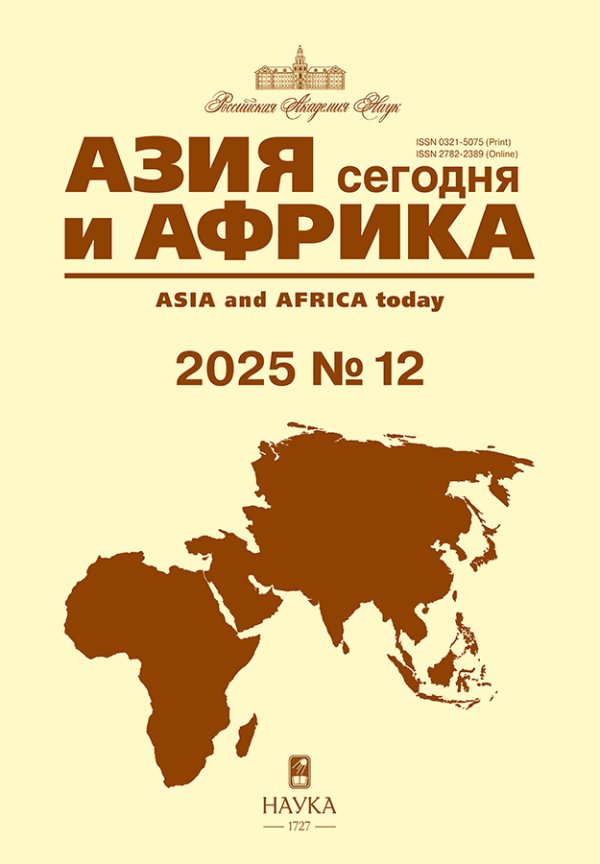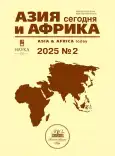Государственная поддержка цифровой трансформации малых и средних предприятий в Индии
- Авторы: Шапошников С.В1, Милли A.1
-
Учреждения:
- НИУ ВШЭ
- Выпуск: № 2 (2025)
- Страницы: 51-59
- Раздел: Политика, экономика
- URL: https://journal-vniispk.ru/0321-5075/article/view/286333
- DOI: https://doi.org/10.31857/S0321507525020065
- ID: 286333
Цитировать
Аннотация
Об авторах
С. В Шапошников
НИУ ВШЭ
Email: svshaposhnikov@hse.ru
ORCID iD: 0000-0003-4563-259X
кандидат экономических наук, доцент, Высшая школа бизнеса Москва, Россия
A. Милли
НИУ ВШЭ
Email: amilli_2@edu.hse.ru
ORCID iD: 0000-0002-3830-5614
магистрант-аспирант двойного трека, Высшая школа бизнеса Москва, Россия
Список литературы
- Ghobakhloo M., Iranmanesh M., Vilkas M., Grybauskas A., Amran A. 2022. Drivers and barriers of Industry 4.0 technology adoption among manufacturing SMEs: A systematic review and transformation roadmap. Journal of Manufacturing Technology Management, 33 (1), 63–89. doi: 10.1108/JMTM-04-2021-0150
- Rao P., Kumar S., Gaur V., Verma D. 2017. What constitutes financing gap in Indian SMEs – owners’ perspective? Qualitative Research in Financial Markets, 9(4). Pp. 385–405. doi: 10.1108/QRFM-07-2017-0073
- Banerjee R. 2014. SMEs, Financial Constraints and Growth. Microeconomics: Intertemporal Firm Choice and Growth. doi: 10.2139/ssrn.1234567
- Dhondge N. 2023. Application of Corporate Governance Measures in Indian SMEs: A Way Forward. Indian Journal of Commerce & Management Studies, 14(3). Pp. 7–16.
- Rahid A.O. 2022. SME financing of commercial banks in Bangladesh: Policy directions based on SME loan borrowers’ view. International Journal of Small and Medium Enterprises, 10(2), 101–114. doi: 10.21642/ijSME.2022.232
- Gupta R., Singh B.P. 2023. Financial Constraints, Investment Climate and Firm Productivity of Small and Medium Enterprises (SMEs) in India. Vision: The Journal of Business Perspective, 27(1). Pp. 11–23. doi: 10.1177/09722629221105825
- Moid S., Dixit S. 2019. The missing middle: bridging the gap of financing needs for women owned SMEs in India. Journal of Economic Development, 5(4). Pp. 412–427.
- Kanojia S., Aggarwal V., Bhargava A. 2020. Descendants of Financing Decision with Reference to Capital Structure: An Empirical Analysis of Indian SMEs. SEDME (Small Enterprises Development, Management & Extension Journal), 47(3). Pp. 195–206. doi: 10.1177/0970846420973231
- Qalati S.A., Ostic D., Ali Sulaiman M.B., Gopang A.A., Khan A. 2022. Social Media and SMEs’ Performance in Developing Countries: Effects of Technological-Organizational-Environmental Factors on the Adoption of Social Media. SAGE Open, 12(4). Pp. 1–15. doi: 10.1177/21582440221105842
- Kaur J., Kumar S., Narkhede B., Dabic M., Rathore A., Joshi R. 2022. Barriers to blockchain adoption for supply chain finance: the case of Indian SMEs. Electronic Commerce Research, 22(4), 1219–1243. doi: 10.1007/s10660-022-09572-5
- Sulistianingsih H., Santi F. 2023. Does SME’s financing decisions follow pecking order pattern? The role of financial literacy, risk preference, and home bias in SME financing decisions. Cogent Business & Management, 10(1). doi: 10.1080/23311975.2023.2023581
- Power A.P. 2021. GetVantage and VIWALA: Our Revenue-Based Financing Journey. Financing Options Journal, 14(3). Pp. 99–110.
- Patil S.C. 2023. Digital India: Opportunities & Challenges. Journal of Digital Transformation, 10(2). Pp. 198–209. doi: 10.3126/jdt.2023.1432
- Gupta M., Akiri C., Aryal K., Parker E., Praharaj L. 2023. From ChatGPT to ThreatGPT: Impact of Generative AI in Cybersecurity and Privacy. IEEE Access, 11, 25432–25449. doi: 10.1109/ACCESS.2023.3242349
- Frandsen S., Duncan R., Pelly M. 2020. Organizational resistance and autoethnography. In The Routledge International Handbook of Organizational Autoethnography. Routledge. Pp. 125–135. doi: 10.4324/9780 429318202
- Mahesh M.K., Aithal P.S., Rao S.K. 2023. Government initiatives and digital innovation for Atma Nirbhar MSMEs/SMEs: To achieve sustainable and inclusive economic growth. International Journal of Management, Technology, and Social Sciences, 8(1), 45–60. doi: 10.47992/IJMTSS.2581.6012
- Sheldrick S., Chang S., Kurnia S., McKay D. 2023. Across the Great Digital Divide: Investigating the Impact of AI on Rural SMEs. Pacific Asia Conference on Information Systems, 19(3), Pp. 15–29.
- Bhiwandikar M. 2014. Role of CGTMSE and CIBIL in Supporting the Indian Economy. Sai Om Journal of Commerce & Management, 1(4). Pp. 46–52.
- Wetering R., Klein R., Keupers P., Smits M., Timmerman K. 2023. How do SMEs shape business model innovation? A digital infrastructure, improvisational, and dynamic capability perspective. Journal of Small Business and Enterprise Development, 30(5). Pp. 712–732. doi: 10.1108/JSBED-03-2022-0073
- Baker Q.B., Al-Rashdan W., Jararweh Y. 2018. Cloud-Based Tools for Next-Generation Data Analysis. Journal of Cloud Computing, 7. Pp. 213–225. doi: 10.1007/s10586-018-1123-y
- Santos M.R., Gomes M.M.F. 2023. Lifelong Digital Learning: “Computer Literacy,” “Digital Literacy,” And “Digital Competence” As Dimensions For Digital Skills. Revista de Gestao Social e Ambiental, 17(4). Pp. 315–328. doi: 10.1177/09578823221105825
- Kurniasari F., Lestari E., Tannady H. 2023. Pursuing long-term business performance: Investigating the effects of financial and technological factors on digital adoption to leverage SME performance and business sustainability – Evidence from Indonesian SMEs in the traditional market. Sustainability, 15(2). Pp. 589–604. doi: 10.3390/su15020589
- Khan M., Gide E., Chaudhry G., Hasan, J. 2022. A Cybersecurity Evaluation Model (CSEM) for Indian SMEs Working in a Virtual Team Environment. Cybersecurity and Privacy, 6(2). Pp. 69–83. doi: 10.3390/cybersecp2020069
- Vercruyssen A., Schirmer W., Mortelmans D. 2023. How “basic” is basic digital literacy for older adults? Frontiers in Education, 8. Pp. 276–290. doi: 10.3389/feduc.2023.1023589
- Gembaczka P., Heidemann B., Bennertz B., Groeting W., Norgall T., Seidl K. 2019. AI and Cybersecurity for SMEs: A Secure Approach. IEEE Access, 7, 67835–67847. doi: 10.1109/ACCESS.2019.2921456
- Sheldrick S., Chang S., Kurnia S., McKay D. 2023. Across the Great Digital Divide: Investigating the Impact of AI on Rural SMEs. Pacific Asia Conference on Information Systems, 19(3). Pp. 15–29.
- AlBenJasim S., Dargahi T., Takruri H., Al-Zaidi R. 2023. FinTech Cybersecurity Challenges and Regulations: Bahrain Case Study. Journal of Computer Information Systems, 63(2). Pp. 156–169. doi: 10.1080/08874417.2023.1234567
- Adeyoju A. 2019. Cybercrime and Cybersecurity: FinTech’s Greatest Challenges. Economics of Networks eJournal. doi: 10.2139/ssrn.3456789
Дополнительные файлы











